Traditionally Lent has been a time to prepare for baptism and the renewal of baptismal vows. The Apostles’ Creed contains the basic statements of Christian faith that Christians have traditionally affirmed at their baptism
I believe in Jesus Christ, God’s only Son our Lord

I believe in Jesus Christ, God’s only Son our Lord
By far the longest section in the Creeds is about Jesus
This doesn’t surprise us, we who call ourselves Christians
are called to follow Jesus.
The Apostles’ Creed tells us
that God is working out a purpose
in the life of Jesus
and in my life and yours.
This is not haphazard random chaos.
it is about how God’s world works
and how we fit into it
We’ve been through the Christmas season and we see unfolded the activity of God’s Spirit in choosing a partner, Mary, and in conceiving a child whose life unfolds as a profoundly saving life.
We get the teaching of Jesus
the Good Samaritan, the love of God , the call to forgiveness, and the promise of the new creation
This comes at a cost
and the cost is paid by Christ
in his body.
The cost brings about a change.
It means we can be open to the mystery of life in God for ever
a new experience of God
which we call resurrection
an entering into heavenly life
which we call ascension and heaven
and the assurance that we are secure in this
through faith in Jesus
which we call judgement.
Where Christ sets us free from the trials and tribulations
of our former limited, deathly life.
Remember, this Creed is a concise way of stating all that God does.
A lot packed into a little.
The three things we can focus on this week
How does Jesus speak to my life? As I look at Jesus, and think about him, as I try to hear the Spirit of Jesus and to talk with him, and listen ...what is God asking me to be and do?
As I recognise that privilege also means responsibility and cost, where am I called to imitate Jesus in my life
Where is God showing me the challenge, joy and hope of eternal life? And How might I respond?
THIS WEEK
Take a little time to ask God to show you more about Jesus, God’s plan, God’s work and Goid’s hope,
















